Simon Guerrier's Blog, page 52
June 30, 2019
The Loosening Skin, by Aliya Whiteley
One benefit of the Arthur C Clarke Award for best science-fiction novel of the year moving from April to July is that when the Dr asked what I might like for my birthday, I could direct her to the shortlist. The result, via my generous in-laws, was three of the six titles: Semiosis by Sue Burke, Frankenstein in Baghdad by Ahmed Saadawi and The Loosening Skin by Aliya Whiteley. (The other three are Revenant Gun by Yoon Ha Lee, The Electric State by Simon Stålenhag and Rosewater by Tade Thompson.)
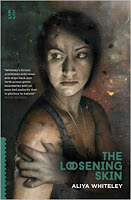 Of these, I've only read work by Whiteley before. The Beauty (2014) is about a world without women and reads like walking through a nightmare, not least because the narrator is so passive. The Arrival of Missives (2016) is a similarly haunting tale, this time set in a village in the shadow of the First World War. Whiteley is brilliant at taking an outlandish, unsettling idea and playing it utterly credibly.
Of these, I've only read work by Whiteley before. The Beauty (2014) is about a world without women and reads like walking through a nightmare, not least because the narrator is so passive. The Arrival of Missives (2016) is a similarly haunting tale, this time set in a village in the shadow of the First World War. Whiteley is brilliant at taking an outlandish, unsettling idea and playing it utterly credibly.
The Loosening Skin is set in the present day but in a world where humans moult. When, every seven years or so, they shed their skin, they also shed its associated love. At the start of the book, Rose is in a loving, tender relationship with a movie star she's also working for as a bodyguard. Then she sheds her skin and can no longer bear to be in the same room with him. But he's used to having whatever he wants and won't accept that.
As we follow this story, we explore the consequences of moulting. It doesn't just affect lovers - who know from their first kiss that they are doomed. When children moult, they no longer love their parents. This world is full of broken people, struggling with attachment, learning not to love so as to preserve something. Brilliantly, we're told humans have always been like this - which has a huge impact on history and culture. There can be no Miss Haversham in this reality, there can be no Last Tango in Halifax.
There's more than the moulting itself. There's a whole culture around the shed skins - displays of celebrity skins in the British Museum, an underground of illegal sales. Then there's the chance that there might be a cure, a way of preventing the moult - but, of course, at a terrible cost.
I got utterly caught up in this richly drawn, horrible world. It's such a disturbing idea and yet it feels so real. At one point, Rose talks us through her moults in turn, each one devastating. That tale-telling is itself part of a truly horrific episode that haunts the rest of the book. I found the novel haunting, and couldn't get it out of my head, but it's not the horrific moments that got me so much as the simple, everyday consequences that result from this one strange idea. There could easily be more stories set in the same world. I hope there are.
 Of these, I've only read work by Whiteley before. The Beauty (2014) is about a world without women and reads like walking through a nightmare, not least because the narrator is so passive. The Arrival of Missives (2016) is a similarly haunting tale, this time set in a village in the shadow of the First World War. Whiteley is brilliant at taking an outlandish, unsettling idea and playing it utterly credibly.
Of these, I've only read work by Whiteley before. The Beauty (2014) is about a world without women and reads like walking through a nightmare, not least because the narrator is so passive. The Arrival of Missives (2016) is a similarly haunting tale, this time set in a village in the shadow of the First World War. Whiteley is brilliant at taking an outlandish, unsettling idea and playing it utterly credibly.The Loosening Skin is set in the present day but in a world where humans moult. When, every seven years or so, they shed their skin, they also shed its associated love. At the start of the book, Rose is in a loving, tender relationship with a movie star she's also working for as a bodyguard. Then she sheds her skin and can no longer bear to be in the same room with him. But he's used to having whatever he wants and won't accept that.
As we follow this story, we explore the consequences of moulting. It doesn't just affect lovers - who know from their first kiss that they are doomed. When children moult, they no longer love their parents. This world is full of broken people, struggling with attachment, learning not to love so as to preserve something. Brilliantly, we're told humans have always been like this - which has a huge impact on history and culture. There can be no Miss Haversham in this reality, there can be no Last Tango in Halifax.
There's more than the moulting itself. There's a whole culture around the shed skins - displays of celebrity skins in the British Museum, an underground of illegal sales. Then there's the chance that there might be a cure, a way of preventing the moult - but, of course, at a terrible cost.
I got utterly caught up in this richly drawn, horrible world. It's such a disturbing idea and yet it feels so real. At one point, Rose talks us through her moults in turn, each one devastating. That tale-telling is itself part of a truly horrific episode that haunts the rest of the book. I found the novel haunting, and couldn't get it out of my head, but it's not the horrific moments that got me so much as the simple, everyday consequences that result from this one strange idea. There could easily be more stories set in the same world. I hope there are.
Published on June 30, 2019 12:19
June 29, 2019
The view from the top of the BT Tower
 Portrait by NimbosLast night, Nimbos took me on an extra-special birthday treat - to the top of the BT Tower.
Portrait by NimbosLast night, Nimbos took me on an extra-special birthday treat - to the top of the BT Tower.As part of the London Festival of Architecture, Tim Ross was doing a comedy set on the 34th floor, and as well as that we got a complimentary glass of fizz and the most extraordinary views as the outer part of the room slowly, slowly revolved.
Here are the pictures and videos I took:

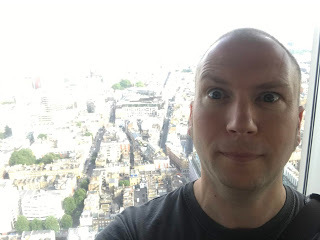






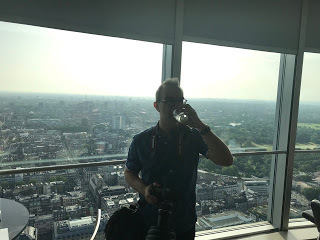
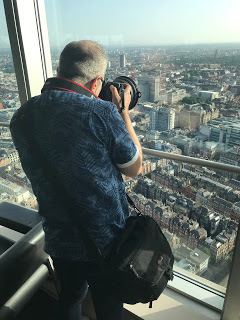


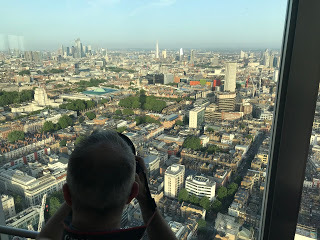
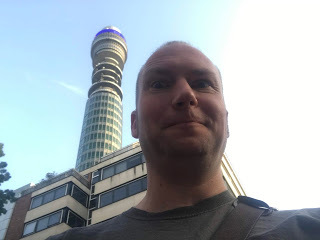
Published on June 29, 2019 04:14
June 27, 2019
Doctor Who Magazine 540
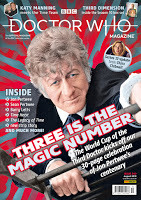 The superb new issue of Doctor Who Magazine is out tomorrow and devoted to Third Doctor actor Jon Pertwee, who was born 100 years ago. There's a lovely interview with his son Sean, and a rediscovered interview with the man himself from the very first Doctor Who convention.
The superb new issue of Doctor Who Magazine is out tomorrow and devoted to Third Doctor actor Jon Pertwee, who was born 100 years ago. There's a lovely interview with his son Sean, and a rediscovered interview with the man himself from the very first Doctor Who convention.I've compiled a special Time Team in which Beth, Christel, Gerard, Kez and Zainab watch three episodes I chose to show a different side of the Third Doctor. Thrillingly, we were also joined by Katy Manning who played companion Jo Grant.
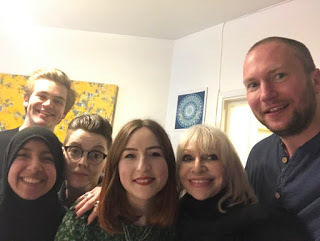 Gerard, Zainab, Christel, Kez, Katy Manning and meThe issue also includes news of something else I've written:
Gerard, Zainab, Christel, Kez, Katy Manning and meThe issue also includes news of something else I've written:"The Target Storybook, a new collection of short stories, will be published by BBC Books on 24 October, RRP £16.99. The book promises that each story will 'expand in thrilling ways upon a popular Doctor Who adventure'. Authors include Colin Baker, Steve Cole, Jenny T Colgan, Susie Day, Terrance Dicks, Simon Guerrier, George Mann, Una McCormack, Vinay Patel, Beverly Sanforod, Matthew Sweet, Mike Tucker, Matthew Waterhouse and Joy Wilkinson."I'm thrilled to be included within such august company. By coincidence, last week I went to see Joy Wilkinson's amazing play, The Sweet Science of Bruising, at Wilton's Music Hall. It took my idiot brain merely until the interval to work out that Aunt George was played by Jane How, who was Rebec in Third Doctor story Planet of the Daleks.
Published on June 27, 2019 06:54
June 26, 2019
No longer secret agent
Exciting! I have signed with a new agent, Steven Russell of Collective Talent, who will represent me in stuff I write for radio, TV and film. The agency website now has a page all about me, including things I've been working on in darkest secret:Simon Guerrier at Collective TalentIncidentally, this is my 1,500th post on this ancient blog.
Published on June 26, 2019 04:58
June 25, 2019
Arrival of Moon
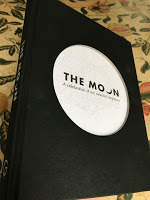 The Moon - A Celebration of Our Celestial Neighbour is a new book published by Royal Observatory Greenwich to accompany the Moon exhibition that opens on 19 July. It's a lovely book full of extraordinary archive material and learned scholarship.
The Moon - A Celebration of Our Celestial Neighbour is a new book published by Royal Observatory Greenwich to accompany the Moon exhibition that opens on 19 July. It's a lovely book full of extraordinary archive material and learned scholarship.Oh, and there's also my essay, "So What If It's Just Green Cheese? The Moon on Screen." I've got in references to Doctor Who, The Clangers and James Bond, among others.Buy The Moon - A Celebration of Our Celestial Neighbour from the RMG website
Published on June 25, 2019 01:58
June 23, 2019
The Secret Life, by Andrew O'Hagan
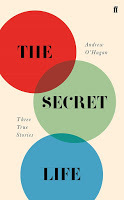 I was given this 2017 book after chatting with a friend about Andrew O'Hagan's 60,000 word essay on the Grenfell fire, which brilliantly conjures the lives so awfully lost and then not-so-brilliantly identifies heroes and villains. This book is subtitled "Three True Stories" and in two of them O'Hagan trails in the wake of extraordinary individuals, reporting on what seem to be pivotal movements in history. In between these instalments, he charts his own experiment in matters of identity - and it's altogether different.
I was given this 2017 book after chatting with a friend about Andrew O'Hagan's 60,000 word essay on the Grenfell fire, which brilliantly conjures the lives so awfully lost and then not-so-brilliantly identifies heroes and villains. This book is subtitled "Three True Stories" and in two of them O'Hagan trails in the wake of extraordinary individuals, reporting on what seem to be pivotal movements in history. In between these instalments, he charts his own experiment in matters of identity - and it's altogether different.First, there's "Ghosting", his account of being employed to ghost the autobiography of Julian Assange, the efforts involved to produce a 70,000-word manuscript, and then why that never got published. It's all really peculiar, and few of the people involved are very likeable, but O'Hagan is good at the small but telling details:
"During those days at the Bungay house I would try to sit [Assange] down with a new list of questions, and he'd shy away from them, saying he wasn't in the mood or there were more pressing matters to deal with. I think he was just keen to get away from [his then residence] Ellingham Hall. I had the internet. I made lunch every day and he'd eat it, often with his hands, and then lick the plate. In all that time he didn't once take his dirty plate to the sink. That doesn't make him like Josef Mengele, but, you know, life is life." (p. 34)That casual sense of other people being there for Assange's convenience illuminates much of the story. The sense is of Assange talking big and then not delivering, or at least not caring about details, or how that lack of care might affect and damage other people. O'Hagan signs off with his last meeting with Assange, when the book is clearly not going to happen.
"It was a Friday night and Julian has never seemed more alone. We laughed a lot and then he went very deeply into himself. He drank his beer and then lifted mine and drank that. 'We've got some really historic things going on,' he said. Then he opened his laptop and the blue screen lit his face and he hardly noticed me leaving." (p. 99)His involvement with Assange leads to him being recommended to Craig Wright, the man who, under the alias Satoshi Nakamoto, invented bitcoin - or did he? In "The Satoshi Affair", O'Hagan recountsWright's efforts to go public and then decide otherwise - just like Assange. Again, it's a fascinating account of what seems a major moment, one that raises issues about identity, our relationship to technology and the truth, and O'Hagan has a ring-side seat throughout. As with Assange, there's a lot of money at stake and a rather glamorous, showbiz lifestyle being lived - but Wright is another sad, trapped figure racked by indecision and doubt. We'd sympathise with his predicament if we didn't see what it costs everyone else around him.
Between these two accounts is "The Invention of Ronald Pinn." It begins in Camberwell New Cemetery, O'Hagan remarking on the number of young people's graves. He identifies one, Ronald Alexander Pinn, who died in 1984 aged 20, but otherwise roughly O'Hagan's own age, and decides to use the dead man's birth certificate to create a false identity. In doing so, he's inspired by recent revelations about undercover policemen from the Met's Special Demonstration Squard using such identities:
"In several of the cases, officers kept their fake identities for more than ten years and exploited them in sexual situations. To strengthen their 'backstory', they would visit the places of their 'childhood', walking around the houses they had lived in before they died, all the better to implant the legend of their second life." (p. 102)So that's what O'Hagan does, touring the places Pinn would have known, researching his life, speaking to people who knew him - and then using that to build up an alternative life. He then wants to see what can be done with such a false identity, and goes on to buy white heroin, cannabis and Tramadol, and counterfeit money. He investigates but apparently doesn't buy guns, as if moral scrupples stop him going that far. But who was he paying for the drugs and fake money, and in giving them money what else was he tacitly financing?
These are not victimless crimes. Living in south London, I'm very conscious of the links between the drug trade and knife crime, the lives of children blighted - and ended - by the supply chain. As a bereaved parent, I had a visceral reaction to what O'Hagan did with the name of some mother's son. He's an unapologetic tourist, blithely enjoying a stroll through other people's misery and grief.
At the end of his account, he finds the mother of the real Ronald Pinn and we realise that she must have provided much of the biographical detail given earlier. But it's telling that this is where his account finishes - we don't hear what her son's death did to her, or what she thinks of what O'Hagan has done with her son's name. O'Hagan is, like Assange and Wright, caught up in the thrill of his own story and seems to spare no thought for those hurt along the way.
Published on June 23, 2019 06:03
June 18, 2019
The October Man, by Ben Aaronovitch
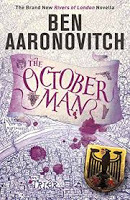 The outrageously named Tobias Winter and Vanessa Sommer are two cops teamed up to investigate a peculiar death - the victim consumed by the noble rot used in making some kinds of wine. Winter, who narrates this case, is the German equivalent of Peter Grant, the narrator of the other Rivers of London books - smart-talking, shrewd and a junior wizard.
The outrageously named Tobias Winter and Vanessa Sommer are two cops teamed up to investigate a peculiar death - the victim consumed by the noble rot used in making some kinds of wine. Winter, who narrates this case, is the German equivalent of Peter Grant, the narrator of the other Rivers of London books - smart-talking, shrewd and a junior wizard.Having only read Lies Sleeping last month, I'd hoped this new instalment would pick up where that ended but this is more of a side-step - apparently, Peter isn't even aware of Winter's existence. I can see that the German police would want to recruit someone very like Peter, but if there's a criticism it's that they're not more distinct in attitude and patter. If I were editing this, I might suggest Vanessa - the non-magical sceptic - should narrate it.
But for that small concern, how brilliant to explore another part of the same world. How thrilling to get some more tantalising detail about what might have happened in the Second World War that Peter's boss, Nightingale, will only allude to - and from a German perspective. It's surely prood of the strength and richness of the world Ben has created that such a side-step is conceivable, let alone done so well.
This is a typically fast-moving, slick murder mystery, full of wry observation and stuff that feels totally real, grounding the magic so we take it in our stride. It's 20 years since I took my higher certificate in wines and spirits (yes, really) but the viticulture all seems right. Ben knows London intimately, so it's quite an achievement to suggest the same confident command of Trier. The novella ends with the case resolved, but suggesting there's more to come. I hope so.
Published on June 18, 2019 11:15
June 17, 2019
Home Guard cover
Here's Tom Webster's amazing cover for
Doctor Who - The Home Guard
, an audio adventure I wrote that's out in November.
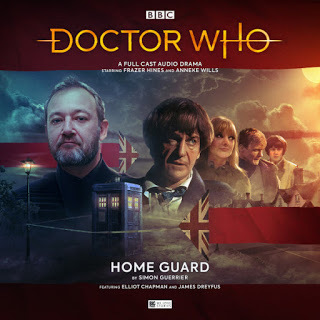

"It’s the middle of the Second World War and Ben Jackson has returned to visit his married friends Polly and Jamie in their quiet English village. But they can’t quite shake the feeling that something’s not right..."
Published on June 17, 2019 09:04
June 15, 2019
The Tombs of Atuan, by Ursula Le Guin
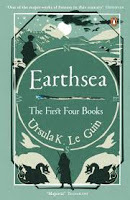 The prologue to The Tombs of Atuan (1971) is barely a page long and utterly devastating. In a valley of blossoming apple trees, a mother calls one of five children in from outside, and the little girl's father chides his wife.
The prologue to The Tombs of Atuan (1971) is barely a page long and utterly devastating. In a valley of blossoming apple trees, a mother calls one of five children in from outside, and the little girl's father chides his wife."Why do you let your heart hang on the child? They're coming to take her away next month. For good. Might as well bury her and be done with it. What's the good of clinging to one you're bound to lose? She's no good to us. If they'd pay for her when they took her, that would be something, but they won't. They'll take her and that's an end of it." (p. 175)The mother can't help herself, and the father, too, is grieving for the loss to come. Their bravery, their acceptance, is awful.
The girl has been identified as the reincarnation of Arha, the priestess ever reborn. In the book proper, we follow her in her new role, carrying our rituals and devising painful death for those who have broken the rules. She has a rival in the temple, and a friend who - shockingly - is not a believer. Arha also explores the labyrinth under the temple: a complex system of tunnels in total darkness, reliant solely on memory if she's not to get lost or fall into traps. We feel the strangeness of it, the danger she's in by exploring ever further. Pushing on into the darkness is as haunting as that prologue.
Then, in chapter 5, Arha is startled by a light in the darkness, cast by a mysterious man. We quickly realise this is Ged, the Wizard of Earthsea from the first book in the series. From Arha's perspective, he's dark-skinned - a detail I missed in the first book but mentioned several times here. Having been given one half of a magical ring or bracelet towards the end of that book, Ged has come to look for the other half, sneaking into the labyrinth and all set to steal it.
Arha, outraged, traps him - but she's also intrigued. She wants to know who he is, what he wants, how he casts his werelight, but the longer she keeps this heretic intruder alive, the more her own position is at risk. Ged also tells her that they're not alone in the darkness; down here, they are prey for evil somethings related to the shadow he battled in the first book.
Arha's predicament is compelling and whatever decision she makes will come at terrible cost. Le Guin is brilliant at making nothing too easy or neat in this simple-seeming story. At one point, Ged is attacked by a character close to Arha and we totally understand why. Ged defends himself and the character is lost to one of the labyrinth's traps. We feel the shock of it, the horror to Arha of losing this loyal figure and her remorse for how she treated them before. In this labyrinth of horrors, with a wizard at her side, it's completely, terribly real.
Without giving away the ending, I felt a pang for the girl's parents. She barely remembers them and doesn't spare them a thought. But surely they'd soon hear of what happens in the story, to the daughter they lost all that time ago. They'll have lost her again, because no one has thought to tell them the truth.
Published on June 15, 2019 05:48
June 11, 2019
Life Drawing, by Jessica Martin
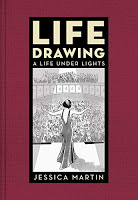 In the midst of yesterday's deluge, a brave postman swam our street to deliver Life Drawing: A Life Under Lights, the autobiography of Jessica Martin told in comic-strip form.
In the midst of yesterday's deluge, a brave postman swam our street to deliver Life Drawing: A Life Under Lights, the autobiography of Jessica Martin told in comic-strip form.I've know Jessica for years through comics and Doctor Who things (she played an alien werewolf in The Greatest Show in the Galaxy (1988-9)), and have read her previous comics work. It Girl (2013) and Vivacity (2014) are biographies of real Hollywood stars, and Elsie Harris Picture Palace (2015) is a fictional story about a Hollywood writer. Her own story continues the theme - a love of cinema's golden age weaving through her life.
I thought I knew Jessica's story, from her first appearances in TV sketch shows doing impressions, then on Doctor Who, to being in the huge stage hit Me and My Girl with Gary Wilmott - which my grandpa took me to see. Her account of her time in Doctor Who, and of producer John Nathan-Turner, didn't tell me anything new. But her book is full of illuminating detail, such as when she was in the pantomime Cinderella alongside a future Doctor Who co-star...
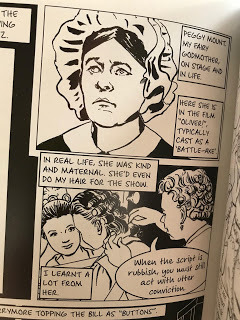 Peggy Mount, as seen in
Peggy Mount, as seen inLife Drawing by Jessica Martin
She's honest too about her own vanity and ambition, and how what she calls "erratic eating" affected her work. But this is much more than a series of showbiz anecdotes. It's not just that old Hollywood and muscials excite her, they inspire her to press on.
For all the breezy, straight-forward style, I loved how Jessica conveys the tangle of relationships and her love for people without condoning their actions. Early on, her dad pulls an "ornamental bull whip off the wall" during an argument with Jessica's mum, and we later learn that her parents were never married as he already had wife. He's a difficult figure, and yet we feel for him when Jessica's mum leaves him and in his estranged relationship with Jessica's half-brother, and in his final days.
The book ends with her sharing her drawing and comics with people who encourage her. Comics is a new chapter in her life, but she faces it with typical determination, passion and energy. That's what radiates from this book. It's inspiring.
Published on June 11, 2019 02:47
Simon Guerrier's Blog
- Simon Guerrier's profile
- 60 followers
Simon Guerrier isn't a Goodreads Author
(yet),
but they
do have a blog,
so here are some recent posts imported from
their feed.



